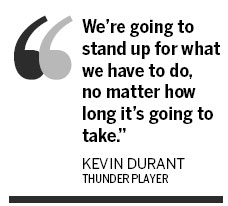Top News
Lockout begins as sides fail to reach deal
(China Daily)
Updated: 2011-07-02 07:57
 |
Large Medium Small |
NBA owners and players remain far apart on new CBA; season could be shortened or lost
NEW YORK - The NBA locked out its players on Friday when its collective bargaining agreement (CBA)expired, becoming the second pro sports league shut down by labor strife
The labor deal ended at midnight after players and owners failed to reach a new contract. The two sides remained far apart on just about every major issue, from salaries to the salary cap, revenues to revenue sharing.
The long-expected lockout puts the 2011-12 season in jeopardy and comes as the NFL is trying to end its own work stoppage that began in March.
It is believed to be only the second time that two leagues have been shut down simultaneously by labor problems.
In 1994, the NHL and MLB were idle from October through to the end of the year. The NHL locked out its players from October 1994 until mid-January 1995 and reduced the 1994-95 season from 84 games to 48. MLB endured a 232-day strike from Aug 12, 1994 until April 2, 1995, which led to the cancellation of the entire 1994 postseason and World Series.
In a call with the labor relations committee on Thursday, commissioner David Stern recommended that the first lockout since the 1998-99 season be imposed.

"We had a great year in terms of the appreciation of our fans for our game. It just wasn't a profitable one for the owners, and it wasn't one that many of the smaller market teams particularly enjoyed or felt included in," Stern said. "The goal here has been to make the league profitable and to have a league where all 30 teams can compete."
Despite a three-hour meeting on Thursday and a final proposal from the players - which NBA leaders said would have raised average player salaries to $7 million in the sixth year of the deal - the sides could not close the enormous gulf between their positions.
"The problem is that there's such a gap in terms of the numbers, where they are and where we are, and we just can't find any way to bridge that gap," union chief Billy Hunter said.
All league business is officially on hold, starting with the free agency period that would have opened on Friday. The NBA's summer league in Las Vegas already has been canceled, preseason games in Europe were never scheduled, and players might have to decide if they want to risk playing in this summer's Olympic qualifying tournaments without the NBA's help in securing insurance in case of injury.
And teams will be prohibited from having any contact with their players, most of whom won't be paid until a deal is done but insist they'll hang in anyway.
"We're going to stand up for what we have to do, no matter how long it's going to take," Thunder star Kevin Durant said. "No matter how long the lockout's going to take, we're going to stand up. We're not going to give in."
The lockout comes exactly one year after one of the NBA's most anticipated days in recent years, when Lebron James, Dwyane Wade and the rest of the celebrated class of 2010 became free agents.
That free agency bonanza - highlight by the James, Wade, Chris Bosh trio in Miami - got the league started on a season where ticket and merchandise sales, ratings and buzz were all up. That weakened the owners' case that the system was broken beyond repair, but it also demonstrated why they wanted changes, with Stern saying owners feel pressured to spend as much as possible to prove their commitment to winning to fans.
The last lockout reduced the 1998-99 season to just a 50-game schedule, the only time the NBA missed games for a work stoppage. Hunter said it's too early to be concerned about that.
"I hope it doesn't come down to that," he said. "Obviously, the clock is now running with regard to whether or not there will or will be a loss of games, and so I'm hoping that over the next month or so that there will be sort of a softening on their side and maybe we have to soften for our position as well."
The NBA appeared headed for this route from the start of negotiations. Owners said they lost hundreds of millions in every season of this CBA, ratified in 2005. League officials said 22 of the 30 teams would lose money.
So they took a hard-line stance from the start, with their initial proposal in 2010 calling for a hard salary cap system, reducing contract lengths and eliminating contract guarantees, as well as reducing player salary costs by about $750 million annually. Though the proposal was withdrawn after a contentious meeting with players at the 2010 All-Star Weekend, the league never moved from its wish list until recently, and Hunter said he believes negotiations never recovered from that rocky beginning.
Associated Press
(China Daily 07/02/2011 page15)
| 分享按钮 |